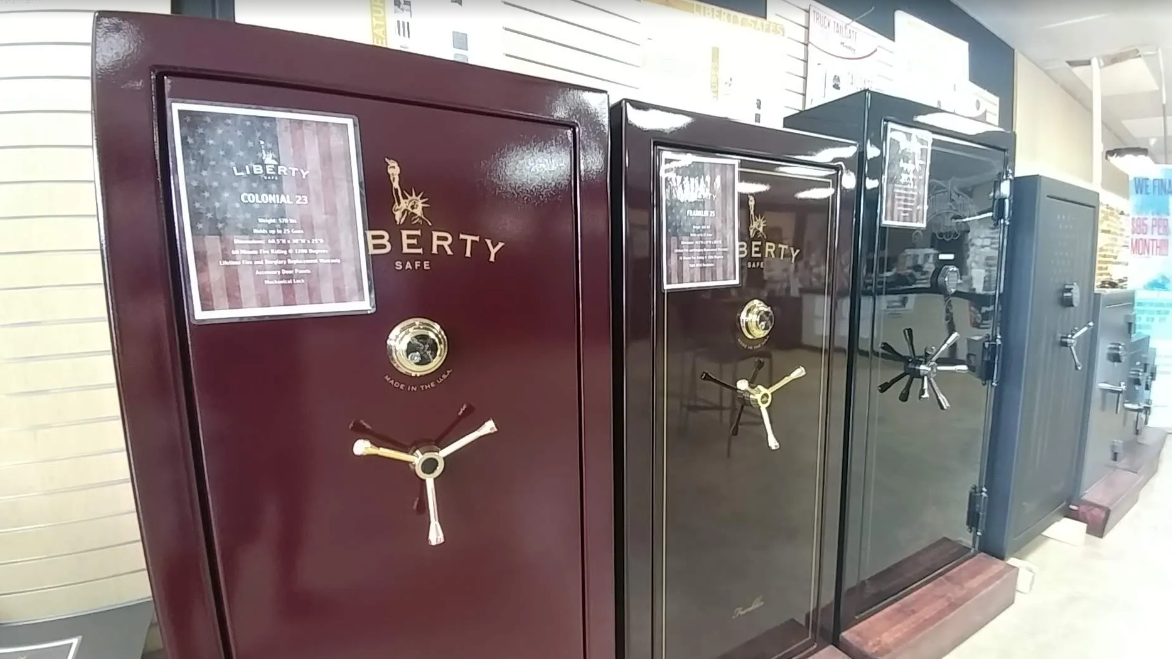If you own long guns, you know how important it is to keep them safe and in top condition. But have you ever wondered if your long gun safe needs a dehumidifier?
Moisture inside your safe can cause rust and damage, putting your valuable firearms at risk. You might be asking yourself: Is a dehumidifier really necessary? Can it protect your guns better? You’ll discover why moisture matters, how it affects your firearms, and whether adding a dehumidifier to your safe is a smart move.
Keep reading to learn how to keep your guns safe, dry, and ready whenever you need them.

Why Moisture Threatens Long Guns
Moisture is one of the biggest threats to long guns. It can cause damage that reduces the gun’s value and function. Long guns are made of metal parts that rust easily. Wood stocks and grips can swell or crack from damp air. Keeping these guns dry is essential for safety and durability.
Inside a long gun safe, moisture can build up unnoticed. This creates a perfect environment for rust and mold. Even small amounts of humidity cause problems over time. Proper storage conditions help protect your firearms for years.
Effects Of Humidity On Firearms
Humidity causes metal parts to rust and corrode. Rust weakens the gun’s structure and can block moving parts. This affects accuracy and reliability. Wood parts absorb moisture, leading to swelling and warping. Changes in shape can make the gun hard to use or clean.
High humidity also encourages mold growth on soft parts. Mold can cause unpleasant smells and damage materials. Over time, moisture can ruin the gun’s finish and reduce its value. Controlling humidity inside the safe is crucial for gun care.
Common Signs Of Moisture Damage
Rust spots on metal surfaces are a clear sign of moisture damage. These spots may start small but spread quickly. Wood components might show cracks or feel sticky. Mold or mildew can appear as dark or fuzzy patches.
Sometimes, a musty odor signals moisture problems inside the safe. Sticking or stiff triggers and actions can also indicate rust buildup. Regular checks help spot these signs early. Taking action prevents costly repairs and maintains gun safety.

Role Of Dehumidifiers In Gun Safes
Gun safes protect firearms from theft and damage. One threat inside a safe is moisture. Moisture causes rust and corrosion on guns. It also damages wood and metal parts. A dehumidifier helps control moisture levels. It keeps the air dry and safe. This extends the life of firearms.
Dehumidifiers create a better environment inside gun safes. They prevent mold and mildew growth. These can harm guns and other stored items. A dry safe also protects ammunition and important documents. Using a dehumidifier is a smart step for gun owners. It adds an extra layer of protection.
How Dehumidifiers Work
Dehumidifiers remove moisture from the air. They use different methods to do this. Some use heat to evaporate water. Others use cold coils to condense moisture. The water collects in a container or drains out. This lowers the humidity inside the safe. A lower humidity level means less rust risk. The device keeps the air stable and dry.
Types Of Dehumidifiers For Safes
There are two main types of dehumidifiers for gun safes. Electric dehumidifiers plug into a power source. They use refrigeration to remove moisture. These work well for larger safes. Another type uses desiccant packs or crystals. These absorb moisture without power. They are simple and low maintenance. Choose the type based on your safe size and needs.
Factors Influencing Dehumidifier Need
Several factors decide if a long gun safe needs a dehumidifier. Moisture control depends on environment, safe type, and how often guns are used. Understanding these factors helps protect guns from rust and damage.
Climate And Environmental Conditions
Humidity levels in the area affect moisture inside the safe. Coastal or wet climates have more moisture. Dry climates have less risk of rust. Temperature changes can cause condensation inside the safe. High humidity or big temperature shifts increase the need for a dehumidifier.
Safe Material And Construction
Some safes block moisture better than others. Steel safes with good seals keep humidity out. Cheaper safes may let air and moisture enter. Interiors with wood or fabric can absorb moisture. These materials may need extra protection from humidity.
Frequency Of Gun Use And Maintenance
Guns used often get cleaned and checked more. This lowers rust risk. Guns left unused inside a safe may collect moisture. Regular maintenance helps spot and stop rust early. Frequent checking reduces the need for a dehumidifier but does not remove it completely.
Alternative Moisture Control Methods
Controlling moisture inside a long gun safe is crucial. Excess moisture can cause rust and damage your firearms. Dehumidifiers are common solutions, but there are other effective ways to keep moisture low. These alternative methods can help protect your guns without using electric devices.
Silica Gel Packs And Desiccants
Silica gel packs absorb moisture from the air inside the safe. They are small, easy to place, and need little maintenance. Desiccants work similarly by pulling water vapor out of the air. Both options help keep the safe dry and reduce rust risks. Replace the packs regularly to keep them effective.
Ventilation And Safe Placement
Proper ventilation reduces moisture buildup naturally. Avoid placing your safe in damp areas like basements. Choose a dry, cool spot with good air circulation. Some safes have vents or small fans to improve airflow. Good placement and ventilation together help keep moisture under control.
Maintaining Optimal Conditions Inside Safes
Maintaining optimal conditions inside long gun safes is key to protecting your firearms. Moisture and dust can cause rust and damage over time. Proper care helps keep guns in good shape and ready to use. Simple steps can improve the safe’s environment and extend the life of your firearms.
Monitoring Humidity Levels
Humidity inside a gun safe should stay below 50%. High moisture causes rust and corrosion. Use a hygrometer to check the humidity regularly. Place it inside the safe where it is easy to read. If levels rise, consider using a dehumidifier or moisture absorbers. These tools help keep the air dry and protect your guns.
Regular Cleaning And Inspection
Clean the inside of the safe often to remove dust and dirt. Wipe down shelves and walls with a dry cloth. Check your guns for any signs of rust or damage. Take action quickly if you see moisture or corrosion. Regular inspection prevents small problems from becoming serious. This care keeps your firearms safe and functioning well.

Choosing The Right Dehumidifier
Choosing the right dehumidifier for your long gun safe helps protect your firearms. It controls moisture, preventing rust and damage. The correct unit fits your safe’s size and keeps humidity low. Consider factors like capacity, power use, and maintenance before buying. These points ensure the dehumidifier works well and lasts long.
Capacity And Size Considerations
Select a dehumidifier that matches your safe’s size. Small safes need smaller units with lower capacity. Large safes require bigger dehumidifiers to control moisture effectively. Check the cubic feet your safe holds. This helps find a model with the right moisture removal rate. Too small means poor moisture control. Too big wastes energy and space.
Power Sources And Energy Efficiency
Dehumidifiers use different power sources. Most plug into standard outlets. Battery-powered options offer more flexibility but need frequent changes. Choose energy-efficient models to save electricity. Look for Energy Star labels or similar ratings. Efficient units keep humidity steady without high costs. This is important for safes used every day.
Maintenance And Longevity
Regular upkeep extends your dehumidifier’s life. Clean or replace filters as needed. Empty water tanks or check drainage systems often. Some models require less maintenance than others. Choose one with easy access to parts. Durable materials resist wear and corrosion. A well-maintained dehumidifier protects your guns for years.
Frequently Asked Questions
Do Long Gun Safes Need A Dehumidifier?
Yes, long gun safes often need dehumidifiers to prevent rust and moisture damage. Moisture can cause corrosion, harming your firearms. A dehumidifier keeps humidity levels low, preserving the gun’s condition and longevity. It’s a simple way to protect your investment.
How Does Humidity Affect Long Gun Safes?
Humidity causes metal parts to rust and wood components to warp inside long gun safes. High moisture levels accelerate corrosion and damage. Controlling humidity extends the life of firearms and safe interiors. Proper humidity management is essential for safe gun storage.
What Types Of Dehumidifiers Suit Gun Safes?
Small electric or silica gel dehumidifiers work well in long gun safes. Electric models actively remove moisture, while silica gel absorbs it passively. Both types are compact and safe for gun storage. Choose based on convenience, cost, and maintenance preferences.
Can A Dehumidifier Prevent Gun Rust Completely?
While a dehumidifier greatly reduces rust risk, it cannot guarantee complete prevention. Regular gun cleaning and proper storage practices are also essential. Dehumidifiers significantly lower moisture but must be combined with other maintenance for best protection.
Conclusion
Long gun safes can trap moisture inside. This moisture can cause rust and damage to your guns. A dehumidifier helps keep the air dry and safe. It lowers the risk of mold and corrosion. Not every safe needs one, but it’s often a smart choice.
Protect your investment and keep your guns in good shape. A dry safe means longer-lasting firearms. Consider your climate and safe type before deciding. Small steps can prevent costly repairs later. Dry guns are ready when you need them.

